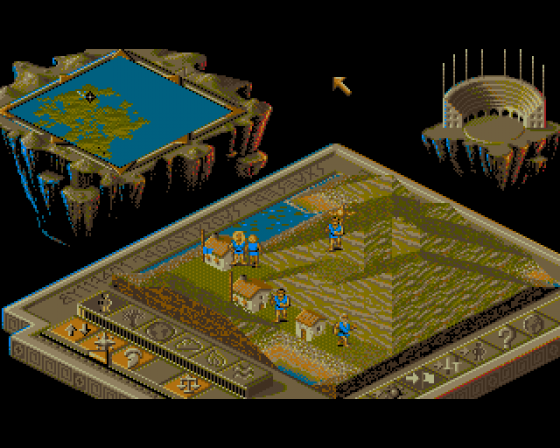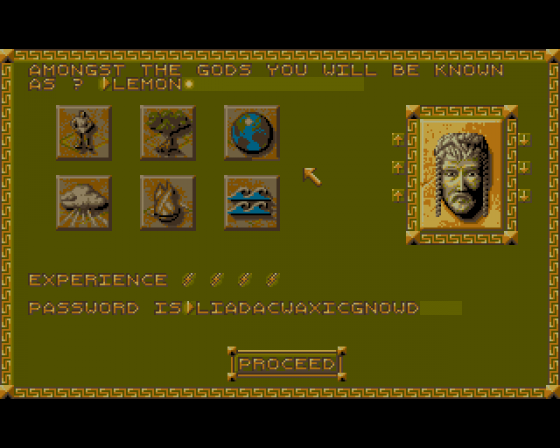
Amiga Power
 1st December 1991
1st December 1991
Author: Matt Bielby
Publisher: Electronic Arts
Machine: Amiga 500
Published in Amiga Power #8
There are good games, there are bad games, and there's Populous II. Years in the making, sequel to you-know-what, it's obviously 'good' - how good's the real question...
Populous II
It's hard to know quite how to approach a game like Populous II. It is, after all, the sequel to arguably the most celebrated and original Amiga game ever, and lots of you will know exactly what it's all about, have a fair idea of how it works, and really just want to know out of a review is if it's any good or not. To impatient Populous fans with thirty quid burning a hole in their pockets then, yes, it's excellent, go out and buy it now.
For the rest of us, however - especially those who've not had their Amigas more than a year or so - some explanation is in order. Populous II - like its parent - is one of those games that sounds incredibly complicated when you try to explain it, but is (a few of the more sophisticated subtleties aside) remarkably easy to play. It is, in essence, an extremely action-packed and varied strategy game, but one with a twist - instead of playing some earthbound general, stuck up on a mountain top somewhere directing the flow of battle, you play god.
This isn't God mind you, but merely a god - ancient greek this time (in the first Populous the time period and religion were unspecific) - with one clear mission in mind, to make his people the dominant race on the map. In each world scenario - and there are a thousand in the game - the randomly computer-generated map places two settlements on the landscape: blue guys (that's your lot) and red ones (boo!) who worship one of a series of rival deities. The game evolves as a battle of wits between yourself and the rival god, the people on the map below mere pawns in your conflicting schemes of things.

Being gods there are, of course, hundreds of god-like things each of you can do to try and destroy the other's people - thrown thunderstorms at them, or whirlwinds, or tidal waves - but equally important is building up the strength of your own worshippers. The most important basic way of doing that is to give them enough flat land to expand onto - settlements can only grow on plains - which you do by raising and lowering the ground around them. It really is as easily said as done - select an area of land with the mouse cursor and one button lowers it, the other raises it, in no time at all creating a nice flat plain. Already you'll see new settlements crop up and existing ones expand as your little computer people get to the business of (ahem) breeding - each time a house gets full up (shown by the height of the blue flag outside) a person leaves and starts a new one, though you can speed things up by clicking on the roofs of houses to get people to leave before they're totally full. In no time at all you'll get quite a nifty city building up, at which point it might be worth popping over to the other side of the map to see how your opponent's doing - happily, the computer god you're put up against in the early games is crap at creating flat land, so you should be able to beat him on sheer weight of numbers alone.
Still, let's assume this is a halfway decent god we're up against. Over there the situation will probably be quite similar to your own - a number of settlements building up, his numbers increasing and so on. (You can check out how well the two of you are doing by looking at the people in the stadium on the top right of your screen). Time to do some damage, quite clearly - it's in the myriad ways that you can wreak destruction on your opponent's people that much of Populous II's appeal comes. As a beginner god you're fairly limited in the number and power of disasters you can control - abilities build up as you defeat more and more opponents, each rival god grudgingly allowing you a smidgeon of experience as reward for having beaten him - but there's still a fair range available, and a lot you can do with each one.
Take the column of fire, for instance - you can set one of these going in the middle of the enemy's town, and watch as it burns up any houses or little people foolish enough to get in its way. Unfortunately, columns of fire are fairly unpredictable - you can't decide with any accuracy exactly where it's going to ignite, or what direction it'll move in once you've got it going - and there is an easy defence against them. If the defending god sets up a mountain nearby, the fire will head towards it (it's drawn towards high land) where it'll eventually fizzle out. Learning defences and counter-measures to enemy attacks is much of the skill of Populous, but so is finding new ways of mixing your own aggressive abilities for more devastating effect - a lone column of fire won't be half as effective as one dropped on a largely wooded area, for instance, where it'll create a raging forest fire. (You might be wise to plant a few trees on enemy soil before you use one, in fact.)

And that, in its basic form, is the game. Yes, it can get incredibly complicated - when things are going wrong you often find yourself caught up in desperate fire-fighting attempts, running frantically around the map trying to save what's left of your people, while at the same time attempting to attack your enemy (and hopefully cause him enough problems to create yourself some breathing space). That the number and power of effects you can generate is directly dictated by the amount of manna (a product of the happiness and numbers of your people) you possess means that, when things go wrong, they go very wrong - you'll be hard-pushed to counter a volcano, say, when you've only got three hut-loads of people left, and they're obviously not at their most relaxed and spiritual when there's white-hot lava bubbling through the carpet! It can be an incredibly frustrating, tear-your-hair-out experience - but then, it's meant to be. Happily things are paced beautifully, so how well you do against each god dictates just how tough the next scenario will be - when you're in trouble, it's because you've mucked things up, not because the game's being incredibly unfair to you. If there's one thing Populous II boasts, it's a lovely learning curve - progress is just tough enough to keep you guessing, just easy enough to make every new opponent seem at least potentially beatable.
But hold it a minute! Describing things in terms of progress through the game does this no favours at all - it makes Populous II sound like something with set levels, set ways of solving puzzles, set objectives and a finite end. It isn't. Perhaps this is one reason why many people respect Populous but have never actually played it, why so many reviews of it are so unfocussed and woolly as soon as they've got past the "you play a god" bit. Perhaps it's easiest to think of most computer games as a set series of puzzles linked together - there's an argument to say they're not actually true 'games' at all. There's always a 'right' way to do it, whether that be by working out the correct route in an FRP game or the exact correct split-second to move your joystick in a shoot-'em-up - it's practice that makes perfect to a large extent, rather than skill.
Populous isn't like that - it's more like chess, or football, or running around shooting paintball pellets at people in a forest, or any other 'real' game you happen to fancy. By that, I mean it forms a game structure with various things you're allowed to do and various things you can't - what happens within those constraints is really up to you. You can solve any one 'problem' - defeating a certain rival god - in a so-close-to-infinite-it's-not-worth-counting number of ways, such are the number of effects and tactics you can juggle. And things are even more open when you take on a human opponent (through linked machines) - it's just about the closest computer games have come to a genuine competitive sport, head-to-head flight sims perhaps excepted.

And that - more than any of the slick programming, or the spectacular visuals, or the very rightness of the whole idea - is what makes it a dead cert as one of the few games it'd ever be worth the bother of taking to a desert island with you. You wouldn't ever complete it as such, and even if you got tired of it after a while, you could guarantee you'd be reaching for it again eventually - it's just not the sort of game you'll never fully exhaust the possibilities of.
When you add to that the resurgence of interest that's bound to happen when Bullfrog get around to releasing the inevitable Worlds disks (ideas currently being kicked around include a Norse gods disk or an Egyptian gods one - though the fact that Bullfrog claim not to know the first thing about either culture, coupled with the wait we've had for the Powermonger disk, makes us suspect it'll be later rather than sooner), you've got a game that people won't just be playing for the next six months, but for years to come.
Yes, existing Populous fans may balk a bit at the idea that Populous II is in many ways just Populous 1 writ large, not genuinely a new game at all (though every component that goes towards making it up is new), and the more dedicated arcade heads might find it a little bit too cold blodded to be interesting (their loss), but the fact remains that there'll be few better ways to spend your time this Christmas. For once, £30 for a game doesn't seem a bit steep (or worse) but an unbelievable bargain, and you can't really praise it much more than that.
The Bottom Line

Uppers: Where do I start? Pleasing graphics, variety, surprises, brilliant pacing, a wealth of things to do and see - and all in service of one of computer gaming's few true original ideas, this time remoulded and polished until it shines. A classic.
Downers: The same basic game design as Populous - some people may not fancy coughing up for essentially the same thing twice. Still vaguely woolly sounding when described - sadly, many folk will simply assume it's not the thing for them.
A pure computer game - it couldn't even begin to work in any other medium - presented with wit and skill and imagination, while all the time laudably aware that its first task is being fun to play. An action game for strategy fans, a strategy game for arcade junkies, and, until Populous III comes along, unmissable.














